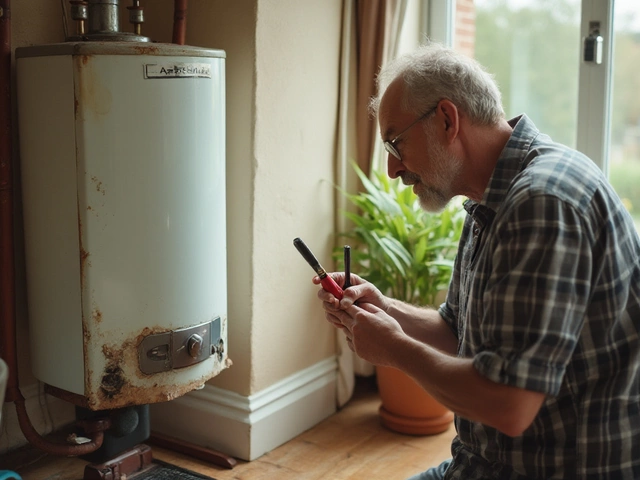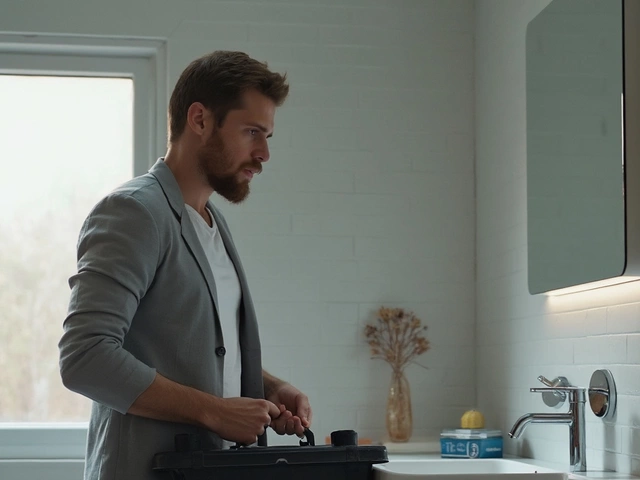If your boiler stopped heating or making strange noises, you might wonder whether you can fix it yourself. The good news is many common problems have easy fixes that a confident DIYer can handle. This guide walks you through the basics, from safety checks to simple repairs, so you can decide if it’s worth the effort or if a professional is needed.
First things first – safety. Boilers involve gas, electricity, and hot water, so you must turn off the power and the gas supply before you start any work. If you smell gas, hear a hissing sound, or feel a strong smell of fuel, leave the house and call a Gas Safe engineer right away. Those situations are not for DIY.
For non‑emergency issues like a lock‑out error code, a tripped thermostat, or a leaking pressure valve, you can usually troubleshoot safely. The key is to read the error code on the display, check the user manual, and follow the steps listed there. If the fix is a simple part swap – a thermostat sensor, a pressure relief valve, or a broken pump seal – you can often do it with basic tools.
1. Reset the boiler. Many modern boilers have a reset button that clears temporary faults. Turn off the boiler, wait 30 seconds, then press the reset. If it fires up again, you may have solved a minor glitch.
2. Check the pressure. Look at the pressure gauge – it should read between 1 and 1.5 bar when the system is cold. If it’s low, locate the filling loop, open the valves, and let water in until the gauge reaches the right level. Close the valves and bleed any air from radiators.
3. Inspect the thermostat. Ensure the thermostat is set higher than the room temperature and that its battery isn’t dead. Swap the battery if needed, or try a different thermostat to rule out a faulty sensor.
4. Look for blocked condensate pipe. A frozen or blocked pipe can cause the boiler to shut down. Clear any ice with warm water or a hair dryer (never use an open flame). Make sure the pipe slopes away from the boiler.
5. Clean the radiators. Air trapped in radiators reduces heating efficiency. Use a radiator key to open the bleed valve, let out the air until water flows, then close it. This often restores heat quickly.
6. Replace a faulty part. If you’ve identified a specific part – like a faulty pump, a broken valve, or a cracked heat exchanger – order the correct replacement from a reputable supplier. Follow the manual’s instructions, use the right wrench sizes, and keep a photo of how the part fits before you remove it.
After any repair, run the boiler for a few minutes while watching for leaks or error codes. If everything looks clean and the heating returns, you’ve saved a call-out fee and learned more about your system.
Remember, regular maintenance keeps most problems away. Flush the system every year, check the pressure twice a year, and schedule a professional service annually. A little DIY can handle the everyday hiccups, but a qualified engineer should still check the boiler yearly to keep it safe and efficient.
So, the next time you hear a click or see a red light, ask yourself: is it a simple reset or a gas leak? If it’s the former, follow the steps above and you’ll likely have warmth back in no time. If you’re ever unsure, don’t hesitate to call a certified boiler technician – it’s better to be safe than sorry.

Curious if you can fix your boiler yourself? This detailed guide covers common boiler problems, easy repairs you can tackle, and when to leave it to the pros.

Water heaters are essential in our daily lives, yet they often fail more quickly than expected. Understanding the common causes of these failures can help in preventing them. In this article, we delve into why water heaters often break down prematurely and offer practical tips on extending their lifespan. Regular maintenance and awareness of common issues are key to ensuring your water heater runs efficiently for years.

Discover the workings of a hob, a crucial kitchen fixture that often gets overlooked until it malfunctions. Learn the common issues that can affect its performance and get handy tips on basic repairs and maintenance. Whether you're dealing with burner problems or electrical faults, this guide provides practical advice to keep your hob in top shape. Understand the typical lifespan of these appliances and how to extend it through regular care.

Discover who to call when your bathroom extractor fan starts acting up. This article explores whether to hire a professional electrician or tackle it yourself, highlighting common issues and maintenance tips. You'll also learn why keeping your fan in top shape matters more than you might think.

When your boiler breaks down, taking a comfortable shower suddenly feels like a luxury. This article explains exactly what happens to your shower when a boiler goes out, ways to still get clean, and when you should call in a professional. Learn alternative methods for washing, bust some myths about cold showers, and get tips on preventing future breakdowns. We even cover what to do if you have kids or need to keep up with fitness routines. Staying clean during a crisis isn’t impossible—you just need a bit of know-how and some creative solutions.

Learn how often to flush your water heater, why it matters, signs it's time, mistakes to avoid, and simple steps to, maintain hot water at home.